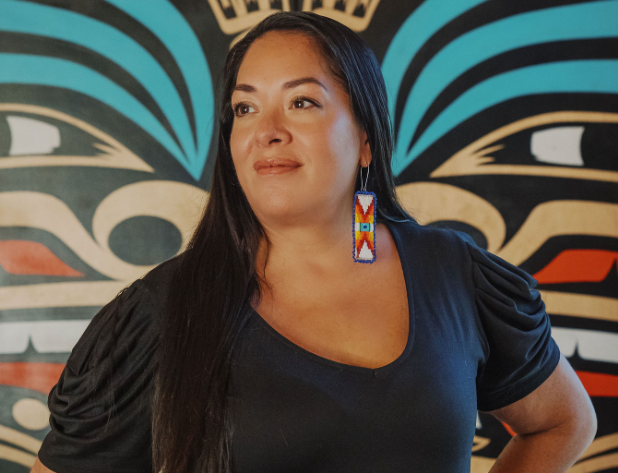
- Details
- By Kaili Berg
Abigail Echo-Hawk, a prominent Indigenous researcher and citizen of the Pawnee Nation of Oklahoma, has been named to the 2024 TIME100 Next list, which honors 100 individuals who are shaping the future of global leadership.
This recognition highlights her groundbreaking work in public health and data sovereignty, especially in relation to Indigenous communities.
The TIME100 Next list, an expansion of TIME magazine's iconic Person of the Year and TIME100 lists, focuses on up-and-coming leaders in diverse fields, including health, politics, climate, arts, and more. Echo-Hawk’s selection solidifies her influence as a leader who is redefining the role of Indigenous values in western research frameworks.
Echo-Hawk is the Executive Vice President of the Seattle Indian Health Board and the director of its research division, the Urban Indian Health Institute. She has long been recognized for her commitment to decolonizing data and ensuring that Indigenous voices are at the forefront of health and policy discussions.
Labeled the "Unapologetic Auntie of Indigenous Data" by the New York Times, Echo-Hawk has dedicated her career to integrating Indigenous methodologies into scientific research, challenging western norms that often overlook Native communities.
“I am deeply humbled and honored to be named alongside some of the world's most brilliant minds, including Indigenous actor Kali Reis,” said Echo-Hawk in a press release. “Indigenous leadership is often recognized only within our own community, so I hold this recognition with immense gratitude for the past, present, and future leaders.”
Echo-Hawk’s work extends far beyond public health research. She is a leading advocate in the fight to end the epidemic of Missing and Murdered Indigenous Women and Girls (MMIWG). A co-author of a groundbreaking report, she brought national attention to the staggering number of MMIWG cases in urban centers across the United States.
Her advocacy doesn’t stop with research, Echo-Hawk uses art as a powerful form of protest. When the Seattle Indian Health Board was mistakenly sent body bags instead of PPE during the COVID-19 pandemic, she created a ribbon dress from body bags to raise awareness for MMIWG, turning the incident into a symbol of resistance.
“Abigail is revolutionizing how governments, institutions, and medical professionals approach health for American Indians and Alaska Natives,” said U.S. Senator Patty Murray in a press release. “Her research and tireless advocacy to address violence against Indigenous women have spurred policy changes across the country, at all levels of government. Abigail is a real changemaker and all of Washington state is proud of her leadership."
Echo-Hawk has also served on several national research committees, including one under the National Academies of Sciences, Engineering, and Medicine, where she contributed to developing an equitable distribution framework for the COVID-19 vaccine. Her leadership has been pivotal in ensuring that Native communities receive fair access to health resources.
As an influential voice in Indigenous health and data sovereignty, Abigail Echo-Hawk’s inclusion in the TIME100 Next list recognizes her vital role in shaping a future where Native voices are empowered, and Indigenous knowledge is valued globally. Her leadership continues to drive forward much-needed reforms in health, policy, and the treatment of Indigenous communities across the nation.
More Stories Like This
Native News Weekly (August 25, 2024): D.C. BriefsUS Presidents in Their Own Words Concerning American Indians
Indigenous Actor Elaine Miles Reports Detention by Alleged ICE Agents
Happy Thanksgiving from Native News Online
Coming Up on Native Bidaské: Behind the Animation: Joey Clift Talks “Pow” and Native Storytelling
Help us tell the stories that could save Native languages and food traditions
At a critical moment for Indian Country, Native News Online is embarking on our most ambitious reporting project yet: "Cultivating Culture," a three-year investigation into two forces shaping Native community survival—food sovereignty and language revitalization.
The devastating impact of COVID-19 accelerated the loss of Native elders and with them, irreplaceable cultural knowledge. Yet across tribal communities, innovative leaders are fighting back, reclaiming traditional food systems and breathing new life into Native languages. These aren't just cultural preservation efforts—they're powerful pathways to community health, healing, and resilience.
Our dedicated reporting team will spend three years documenting these stories through on-the-ground reporting in 18 tribal communities, producing over 200 in-depth stories, 18 podcast episodes, and multimedia content that amplifies Indigenous voices. We'll show policymakers, funders, and allies how cultural restoration directly impacts physical and mental wellness while celebrating successful models of sovereignty and self-determination.
This isn't corporate media parachuting into Indian Country for a quick story. This is sustained, relationship-based journalism by Native reporters who understand these communities. It's "Warrior Journalism"—fearless reporting that serves the 5.5 million readers who depend on us for news that mainstream media often ignores.
We need your help right now. While we've secured partial funding, we're still $450,000 short of our three-year budget. Our immediate goal is $25,000 this month to keep this critical work moving forward—funding reporter salaries, travel to remote communities, photography, and the deep reporting these stories deserve.
Every dollar directly supports Indigenous journalists telling Indigenous stories. Whether it's $5 or $50, your contribution ensures these vital narratives of resilience, innovation, and hope don't disappear into silence.
 The stakes couldn't be higher. Native languages are being lost at an alarming rate. Food insecurity plagues many tribal communities. But solutions are emerging, and these stories need to be told.
The stakes couldn't be higher. Native languages are being lost at an alarming rate. Food insecurity plagues many tribal communities. But solutions are emerging, and these stories need to be told.
Support independent Native journalism. Fund the stories that matter.
Levi Rickert (Potawatomi), Editor & Publisher

